Key takeaways
- Action short films effectively use visual storytelling to create immersive experiences and convey powerful narratives in a limited timeframe.
- Character development, such as Peter Parker’s, enhances audience connection through relatable struggles and moral dilemmas.
- Key lessons from Peter Parker include the importance of empathy, accountability, and growth through challenges.
- Practicing responsibility in everyday life, like volunteering and mentoring, can lead to personal growth and stronger community ties.
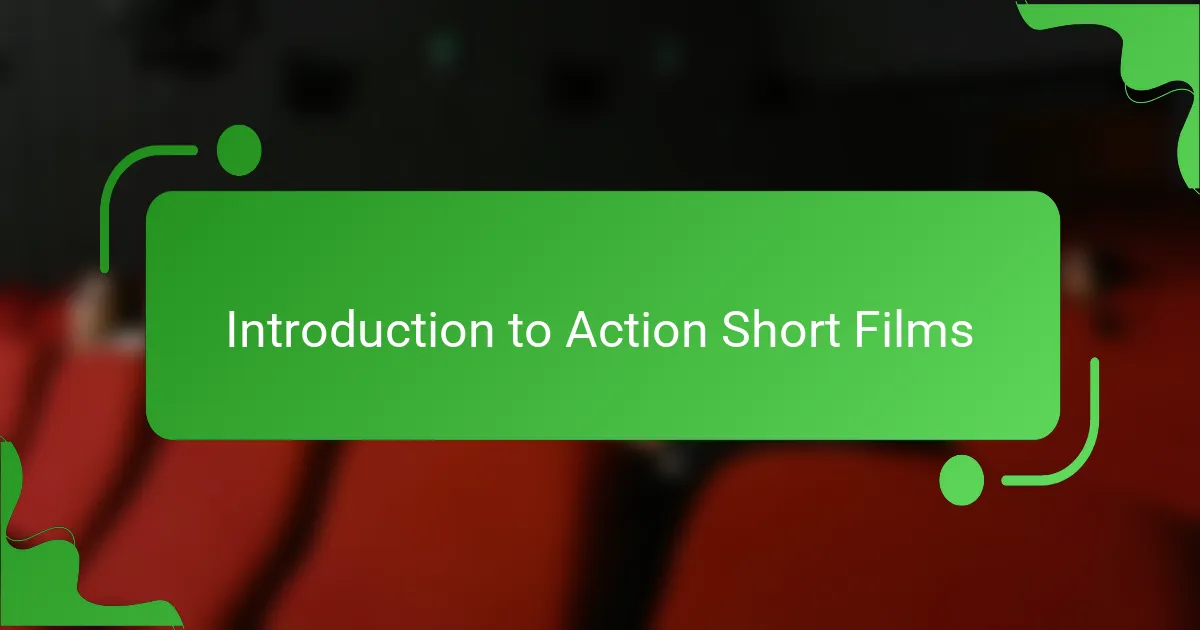
Introduction to Action Short Films
Action short films are an exhilarating form of storytelling that packs a punch in just a few minutes. I remember the first time I watched one; the adrenaline rush was palpable, and I was instantly hooked. These films often rely on visual storytelling, using captivating action sequences to convey emotion and narrative depth in a compact format.
What’s fascinating about action short films is their ability to create immersive worlds quickly. They transport us from our mundane realities into high-stakes scenarios, where every second counts. Have you ever found yourself on the edge of your seat, wondering how the hero will escape a seemingly impossible situation? That suspense is part of what makes action shorts so powerful.
These films often showcase innovative choreography, strong character arcs, and breathtaking cinematography, all within a limited timeframe. I find it incredible how filmmakers can create a fully realized story with such brevity. It’s a testament to the art of concise storytelling, and it leaves me pondering the immense talent behind the craft.
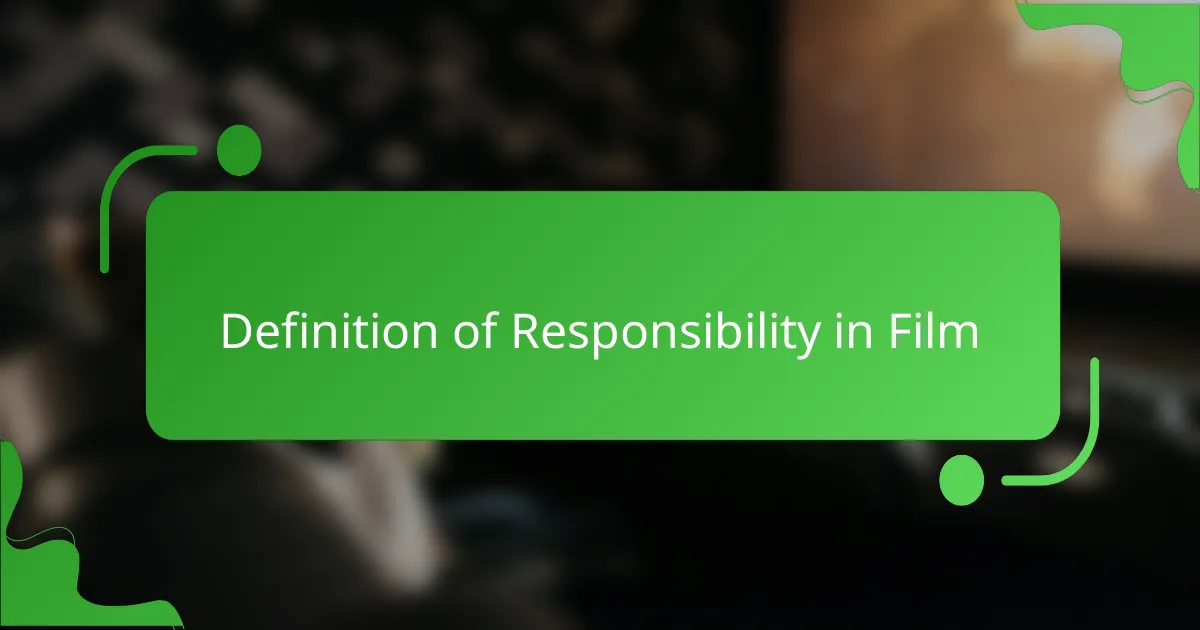
Definition of Responsibility in Film
Responsibility in film often revolves around the choices characters make and the moral dilemmas they face. I’ve noticed that a character’s sense of responsibility can propel the narrative forward and shape their development. When watching a film, I often find myself asking, “Would I make the same choice in that situation?” This reflective question deepens my emotional connection to the story.
In action shorts, responsibility frequently manifests in the protagonist’s struggle between personal desires and broader consequences. For instance, a hero might have to choose between completing a mission or saving a friend. This tension doesn’t just drive the plot; it also resonates with audiences, reminding us of our own daily choices.
Ultimately, responsibility in film serves as a mirror to our lives. It challenges us to reflect on our actions and their impact on those around us. I appreciate how these narratives can spark discussions about ethics and morality, something that stays with me long after the credits roll.
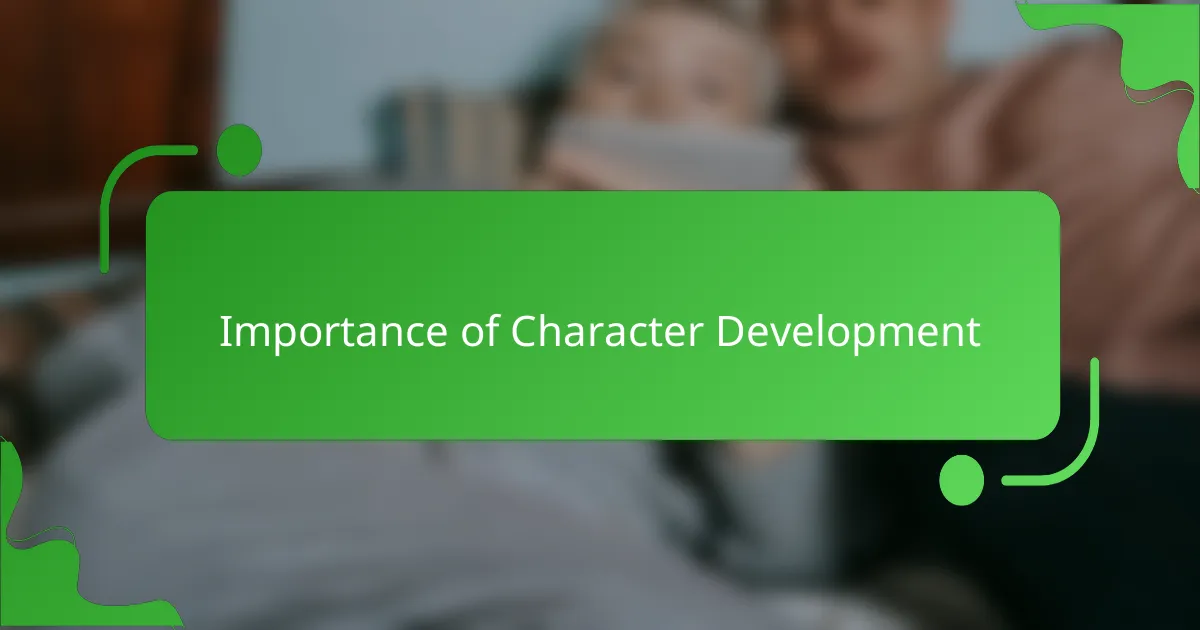
Importance of Character Development
Character development is crucial in shaping how audiences connect with Peter Parker, also known as Spider-Man. As I’ve followed his journey in various adaptations, what strikes me is how his choices define him—especially when he grapples with the weight of his responsibilities. For instance, seeing Peter struggle with his decision to protect his friends and family at the cost of his personal happiness resonates deeply; it reminds me of times when I had to prioritize my duties over my desires.
When we delve deeper, we see that well-rounded characters like Peter Parker evolve through their experiences, allowing viewers to relate and empathize.
- Gaining a sense of relatability as he faces ordinary challenges, such as school and relationships.
- Experiencing growth through failures, such as losing loved ones and learning from mistakes.
- Developing a moral compass that drives his actions, reflecting complex themes of duty and sacrifice.
- Showcasing the conflict between personal desires and greater responsibilities, creating emotional depth.
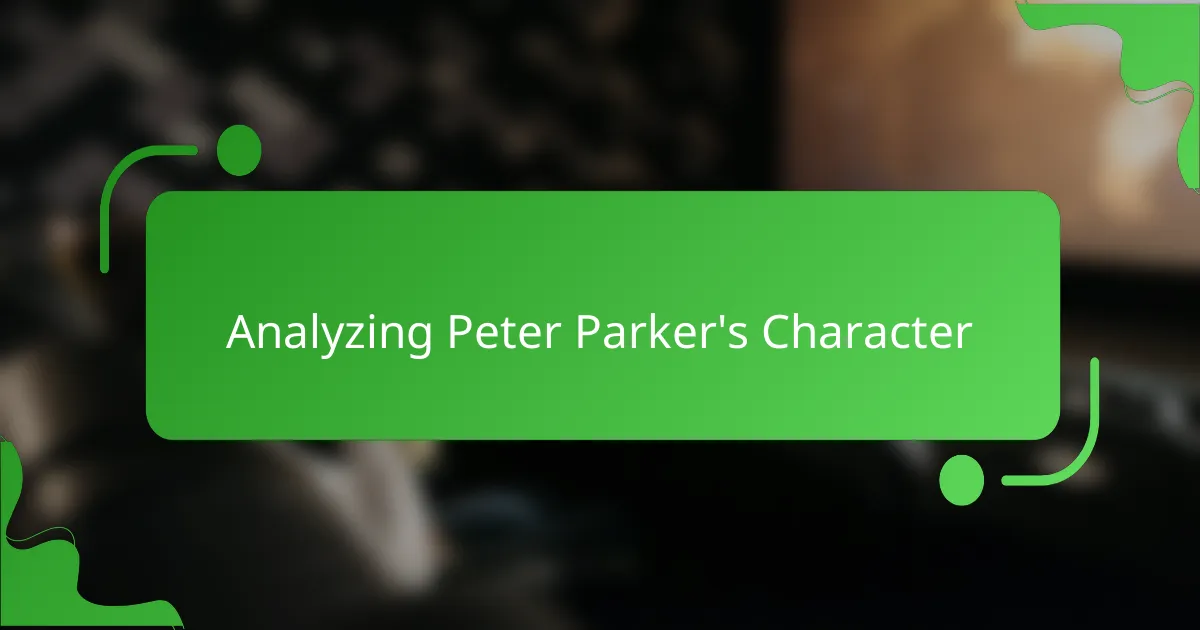
Analyzing Peter Parker’s Character
Peter Parker embodies the intricate balance between personal desires and the responsibilities of being a hero. I often find myself reflecting on the moments when he chooses to put others first, even when it costs him dearly. It’s almost as if I can feel the weight pressing down on him, a reminder that our choices can shape not just our lives but the lives of those around us.
When analyzing Peter’s character, I can’t help but admire the vulnerability he displays. He’s not just a superhero; he’s a young man grappling with the challenges of growing up, friendships, and loss. This makes him relatable—how many of us have felt the sting of making difficult choices? I remember a time when I had to step up for a friend in need, putting my plans on hold. It’s these moments that elevate Peter from a comic book character to someone I can genuinely connect with.
Moreover, Peter’s journey is a testament to the idea that heroism isn’t just about physical strength; it’s about emotional resilience and moral integrity. I see his evolution as a process of learning from mistakes, which resonates with my own experiences. Have you ever faced a moment where you had to reevaluate your priorities? For Peter, each decision reinforces his growth and commitment to doing what’s right, even when the path isn’t easy.

Lessons from Peter Parker
Peter Parker’s journey is a masterclass in the idea that with great power comes great responsibility. I remember watching him grapple with the weight of his choices, especially in moments where he faced the consequences of his actions. It struck a chord with me, as I’ve always felt that our responsibilities often shape our character and impact those around us more than we realize.
His story teaches us several key lessons:
- Consequences Matter: Every action has repercussions, and understanding this is vital.
- Empathy is Crucial: Peter’s ability to empathize with those he protects showcases the importance of compassion in leadership.
- Growth Through Struggle: Peter’s failures often lead to personal growth, highlighting that adversity can teach us invaluable lessons.
- Accountability: Taking responsibility for mistakes, like when he confronted his past decisions, is essential for personal integrity.
- Prioritizing Relationships: At the end of the day, cherishing relationships often brings out the best in us.
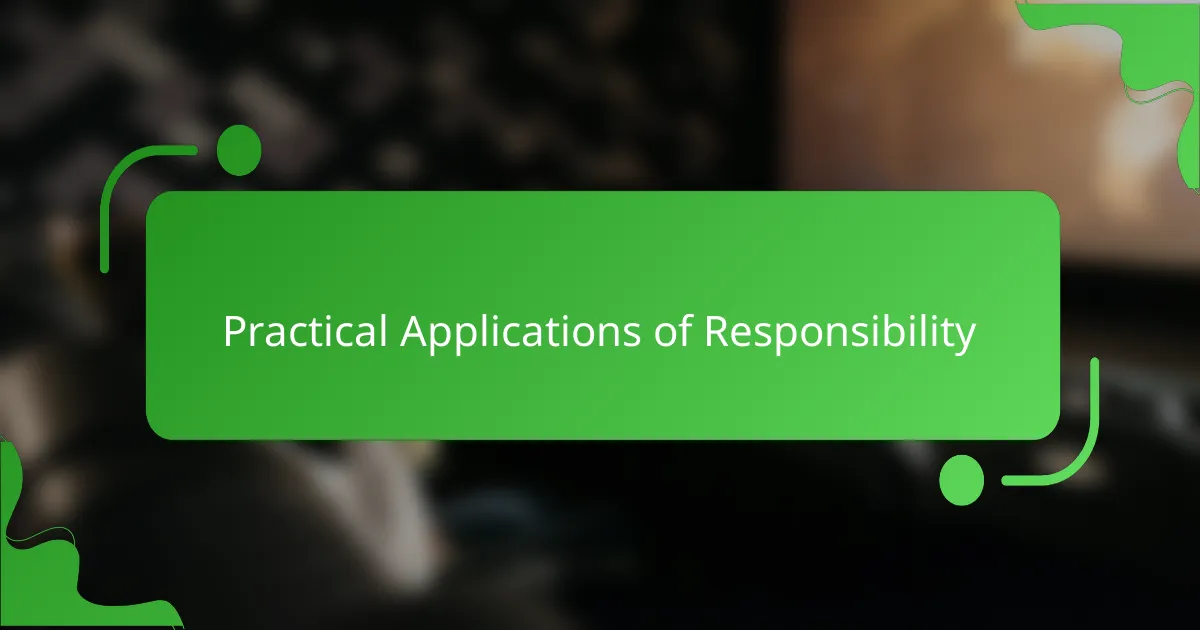
Practical Applications of Responsibility
When I reflect on Peter Parker’s sense of responsibility, I can’t help but relate it to my own experiences. Taking ownership of my actions, whether in my career or personal life, has taught me that responsibility often involves making difficult choices. It reminds me of a time when I had to step up to help a friend in need, even when it was inconvenient for me. The sense of fulfillment that followed was remarkable, illustrating how responsibility can lead to personal growth.
In practical terms, applying responsibility can transform everyday actions into meaningful contributions. This isn’t just about feeling obligated; it’s about acting with intent. Here are some ways I resonate with this idea:
- Volunteering: Giving your time can positively impact your community, reflecting the spirit of Peter’s selflessness.
- Mentoring Others: Sharing knowledge and guiding someone can be incredibly rewarding, promoting personal growth in both mentor and mentee.
- Owning Mistakes: Acknowledging when we’re wrong allows us to learn and improve, reinforcing trust in relationships.
- Setting Boundaries: Understanding your limits is critical. It’s like knowing when to swing into action and when to step back, much like Peter navigating his dual life.
- Engaging Locally: Getting involved in community initiatives strengthens bonds and reaffirms our ties to those around us.
These applications illustrate that responsibility isn’t just a burden; it can lead to deeper connections and a more fulfilling life.


